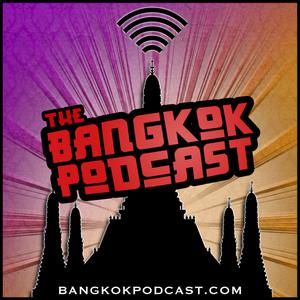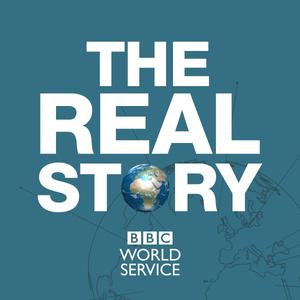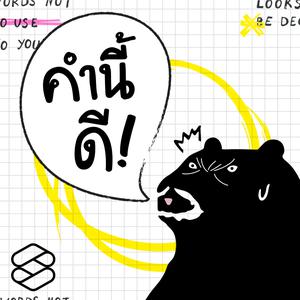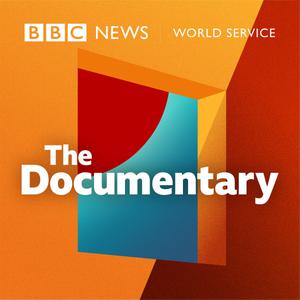
The Bangkok Podcast | Conversations on Life in Thailand's Buzzing Capital
Greg Jorgensen & Ed Knuth
Stories, rants & observations on life in Asia's craziest city.
- 41 minutes 55 secondsBangkok's Craft Brew Godfather: A Chat with Khun Chit [S7.E55] (Classic Recast)
Greg interviews the fascinating Wichit Saiklao, godfather of craft beer in Thailand and founder of Chit Beer, with podcast friend Scott Coates sitting in for fun. Khun Chit relates how he first learned about homebrewing while living in the States, and after returning to Thailand and buying a small house on the river island of Ko Kret, he decided to give it a try with a kit he bought on Amazon. Just seven years later, he is a legend of Thai brewing, not just because of his own popular craft beers but also because of his brewing school which now has thousands of graduates.
Khun Chit explains his approach to Thai law, which in general prohibits small batch brewing: by focusing on staying under the radar while campaigning to change the law and spreading his love of brewing to his ‘army’ of brewers, he hopes to push Thai culture in the right direction. He estimates that there are already tens of thousands of Thai people brewing quietly at home, a number so large that eventually the Thai government will likely have to accept as a fact of life.
Greg, Scott and Khun Chit discuss the community of brewers that he has fostered and spread around the country, his ignoble first attempts at brewing, and what drives him forward.
Don’t forget that Patrons get the ad-free version of the show as well as swag and other perks. And we’ll keep our Facebook, Twitter, and LINE accounts active so you can send us comments, questions, or whatever you want to share.
28 January 2025, 5:01 pm - 44 minutes 7 secondsWhat Changes Would Ed Make if He Was in Charge of Thailand? [S7.E54]
Greg and Ed engage in a bit of fantasy as Ed imagines what he would do if he were the Prime Minister (or maybe more accurately, dictator) of Thailand. Ed begins with the caveat that he can only see the world through his own eyes, so his dream policies probably will not align with the average Thai person or maybe even most foreigners.
Ed presents a total of ten changes he would make to the country if he could, and Greg gives wise counsel for each proposal. In no particular order, Ed suggests building a modern prison system to buttress the rule of law, making significant investments in the riverfront, completing the Kra Canal Project, and eliminating dual pricing nationwide. He also emphasizes the need to modernize the laws that govern expats in Thailand, which seem to have been written in the Dark Ages. To top it off, Ed strongly prefers the old-school elephant flag to the current three-striped flag, and he’d rather the country be formally known as Siam due to the racist origins of the name ‘Thailand.’
Greg is impressed with the depth of Ed’s plans and vows to come up with his own suggestions. Some day. :)
Don’t forget that Patrons get the ad-free version of the show as well as swag and other perks. We also sometimes post on Facebook, you can contact us on LINE and of course, head to our website (www.bangkokpodcast.com) to find out probably more info than you need to know.
21 January 2025, 5:01 pm - 47 minutes 20 secondsWhat's It Like Being An Exchange Student in Thailand? [S7.E53]
Greg interviews our new friend Jannik Hiller about his experience as an exchange student in Thailand. Jannik explains that while a university student, he decided he wanted to do an exchange year in a country completely different from his native Germany, so he settled on Thailand, despite never having been here before.
Greg wonders about the quality of education in Thailand versus Germany, and Jannik explains that he was willing to sacrifice some academic quality just for the experience of traveling and living in a foreign land. Jannik then recounts his first month in the country, getting ready for school to start. After an initial shock, he fell in love with exploring Bangkok and acclimated to a dorm at Chulalongkorn University for international students. He talks about interacting with students from the U.S., Mexico, Japan, and Italy, a cosmopolitan experience that led him to pursue a Master’s Degree outside of Germany.
Jannik then expounds on the differences in the academic experience: Thai university is more formal than in Germany, given that students have to wear uniforms and the professors are treated with more deference. Further, the courses involved more group work and presentations than his typical classes back home.
Overall, Jannik’s experience at a Thai university was a very positive contrast to his typical European education, and with the help of the Bangkok Podcast, he has become a true Thai-phile (like the rest of us!).
Don’t forget that Patrons get the ad-free version of the show as well as swag and other perks. We also sometimes post on Facebook, you can contact us on LINE and of course, head to our website (www.bangkokpodcast.com) to find out probably more info than you need to know.
14 January 2025, 5:01 pm - 34 minutes 54 secondsKeeping Resolutions in Bangkok: A Fool's Errand? [S7.E52]
Greg and Ed ring in 2025 with a difficult look back at their New Year’s Resolutions from 2024. They recognize the obvious: if you don’t keep your resolutions, you only have yourself to blame. But they try to answer the interesting question of whether Bangkok itself might make keeping certain resolutions more difficult.
Ed begins with a confession that he mostly failed in his efforts to improve his Thai. His plan was to study a well-regarded PDF of common Thai expressions, and while he did succeed in having a Thai friend make some recordings, he didn’t spend much time actually studying them. His second resolution was to watch the top ten best Thai films of all time, and watch them in Thai with Thai subtitles. Again, although he downloaded some of the films, he blew off actually doing the hard work. Ugh.
Greg fared somewhat better. Although he failed to watch a movie and read a book about key figures in Thai history, he did manage to spend more time at the Siam Society and develop a new hobby, the Japanese art of archery known as kyudo. Yea Greg!
Ed’s last resolution involved an effort to establish a new ‘third place.’ In this case, some serious effort was put forth at a very Thai local gym, but Ed failed to make any meaningful connections and eventually couldn’t muster the motivation to keep going.
Both guys conclude that expat life can make it difficult to keep these types of ‘self-improvement’ resolutions: expats tend to live in very self-contained bubbles that don’t make it easy to make significant changes to your life. Given this insight into the expat situation, in the end, it’s all on you to find a way to get it done. :)
Don’t forget that Patrons get the ad-free version of the show as well as swag and other perks. We also sometimes post on Facebook, you can contact us on LINE and of course, head to our website (www.bangkokpodcast.com) to find out probably more info than you need to know.
7 January 2025, 5:01 pm - 36 minutes 5 secondsLooking Back, Looking Forward: What’s Next for BP in 2025 [S7.E51]
In a year-end wrap up, Greg and Ed discuss their favorite shows of the year and some plans for the podcast in 2025. Ed begins by waxing rhapsodic over his early year interview with David Cluck, Hollywood assistant director who has been based in Bangkok for the last 10 years or so (S7, Ep. 6-7). The flow of the interview was aided by the fact that David and Ed are friends, but Ed points out that it’s rare to sit down with a friend and discuss their career in depth. As a film nerd, Ed (and Greg) enjoyed David’s experience and insider storytelling ability.
Greg then brings up our episode on Bangkok in your 20s vs. Bangkok in your 50s (S7, Ep. 29). Greg enjoys having pearls of wisdom about living in Bangkok that only come from having lived in Thailand so long, and Ed appreciated the way the city’s pros have changed for him from the early days to his (now) fifty-ish lifestyle. Next, Ed mentioned his other favorite interview show, with Ron Weaver, ‘American-Thai Guy’ (S7, Ep. 11-12). Both Ed and Greg enjoyed Ron’s personality and insights, and the fact that his experience as an African-American guy gave him a different take on expat life in Thailand.
Greg’s next favorite episode was the one on ‘Expat Math,’ our attempt to understand Bangkok with various theories and equations (S7, Ep. 16). There’s no denying Bangkok’s chaotic nature, but that doesn’t mean it’s completely random, and the guys enjoy trying to wrap their heads around the City of Angels and come up with some guiding principles. Ed’s last favorite episode was his take on Bangkok vs. Hong Kong (S7, Ep. 24). As someone who doesn’t travel all that much, Ed enjoyed being able to experience the iconic city and weigh it against his home.
Greg wraps up the favorites by bringing up our show on ‘The Limits of Mai Pen Rai,’ (S7, Ep. 40). Both guys agree this might be their ‘angriest’ episode, but defend the right to put their foot down when it comes to inaction to solve problems that result in horrible tragedies, especially when they’re in the service of improving safety for everyone.
Last, Greg and Ed discuss their plan to use the last week of every month to air an old show, rather than putting out a new show every week. The truth is the guys need a breather to help them brainstorm new material, but also think listeners would benefit from listening to many of the old gems from previous years.
Don’t forget that Patrons get the ad-free version of the show as well as swag and other perks. We also sometimes post on Facebook, you can contact us on LINE and of course, head to our website (www.bangkokpodcast.com) to find out probably more info than you need to know.
31 December 2024, 5:01 pm - 30 minutes 26 secondsSetting Down Roots in Bangkok: Should You Rent or Buy? [S7.E50]
Greg and Ed tackle the age-old question for expats living in Thailand: Should I buy or rent a condo or house? The boys begin by making clear there is not one simple answer to this question, and it depends a LOT on a person’s particular circumstances, such as budget, length of stay, and investment expectations. Nevertheless, there are general questions that everyone should consider when making this decision. Hat tip to a video that ThailandBound posted for providing the brainstorming.
The guys go through seven separate topics, ranging from possible double pricing for Thais and foreigners, to the consideration that must be given to condo maintenance fees and the difficulty of finding repairmen if you are an owner. Further, Bangkok is famous for new construction, and each new building may have amenities that make your 5-year-old building feel (and look) ancient by comparison. On top of all this, there are cultural considerations, such as Thais’ notorious fear of ghosts and bad luck in general, hence their preference for buying new rather than lived-in residences.
While there’s no single answer for all expats, everyone planning a long stay in the Kingdom should certainly consider these factors before making such an important decision.
Don’t forget that Patrons get the ad-free version of the show as well as swag and other perks. We also sometimes post on Facebook, you can contact us on LINE and of course, head to our website (www.bangkokpodcast.com) to find out probably more info than you need to know.
18 December 2024, 2:05 am - 42 minutes 47 secondsFilmmaker James Newman on his Documentary Bangkok: City of Angels [S7.E49]
Greg interviews writer and filmmaker James Newman, a long-time expat in Thailand who recently made a documentary film about our beloved city of Bangkok. James starts out explaining his background in London as an insurance executive, his subsequent departure to Thailand, and his career as a writer during the e-book boom of the naughts. Around 2017 he transitioned to filmmaking and made a successful short film called ‘Crazy Medicine,’ directed by friend of the podcast Richie Moore.
But today’s show centers on James’ recent film, “Bangkok: City of Angels,” an attempt to capture the chaotic appeal of Bangkok in documentary form. James discusses his decision to cover a broad arc of Thai history, from a cholera outbreak 200 years ago to the more recent COVID pandemic, explaining that he wanted to show the ways in which history can appear to repeat itself and the ways that Thais overcome adversity.
The two discuss the dozens of significant events in Thai history that have shaped Bangkok, from the founding of the city through to World War II and the Vietnam War. More recently, the film considers the 1997 financial crisis, the various political upheavals, up through the pandemic, during which the film was shot.
While it may be impossible to capture the true essence of Bangkok in one film, “Bangkok: City of Angels” certainly is a serious effort in that direction.
Don’t forget that Patrons get the ad-free version of the show as well as swag and other perks. We also sometimes post on Facebook, you can contact us on LINE and of course, head to our website (www.bangkokpodcast.com) to find out probably more info than you need to know.
10 December 2024, 5:01 pm - 46 minutes 36 secondsBehind the Scenes: Making an Episode of the Bangkok Podcast [S7, E48]
In a first, the Bangkok Podcast turns its focus on itself as Greg and Ed explain the process by which they create two shows almost every week of the year. The boys begin discussing their approach to brainstorming topics for new shows. Given that the podcast has been around for more than 10 years and there are more than 700 back episodes in total, coming up with fresh ideas is not easy. So the guys tend to mine their personal experiences, the lives of their friends, evergreen news stories that highlight perennial issues with Thai society, and of course, suggestions from listeners. (In fact, if you have any good ideas, please send them in!)
Does the podcast follow a script? Conversationally, no. Greg and Ed simply have a topic and bullet points and they flow from there, but there is a structure to the show that includes background music, cues, and common themes. What about the recording process? Well, as two tech geeks, the guys do take advantage of semi-professional gear. Ed speaks into a dynamic microphone connected to a digital mixer that acts as an interface to his Windows 11 PC. Greg records with a condenser microphone connected to his MacBook Air. They record separately at home while on a Facebook call, and then upload the audio to a Google Drive folder. Greg then typically does the edit, recently with an open source but professional tool known as Reaper.
As for posting, the podcast uses a platform called Libsyn, which allows them to upload an episode to one location and then have it dispersed to multiple outlets.
When it comes to general advice, Ed encourages newbies to go easy on the technology. Today, the barriers to entry are low, and a couple iPhones with lav mics are probably all that are necessary to get started. However, over time, mastering better technology is undoubtedly key to making your life easier.
Don’t forget that Patrons get the ad-free version of the show as well as swag and other perks. We also sometimes post on Facebook, you can contact us on LINE and of course, head to our website (www.bangkokpodcast.com) to find out probably more info than you need to know.
4 December 2024, 2:30 am - 41 minutes 37 secondsFrom the Vault: Five Observations on What Makes Thai Culture Thai [S7.E47]
In a first for the podcast, the boys decide to review a part of the Bangkok Podcast website - the relatively new for Season 4 ‘Resources’ section. A few weeks back we posted a page called ‘Some Thoughts on Thai Culture,’ and it elicited some responses from friends of the podcast, so we decided to dig into it.
We don’t want to rehash what’s already there, so if you haven’t read it yet, mosey on over and check it out. In brief, the page lists 5 key characteristics of Thai culture: 1) Respect for authority; 2) Being indirect; 3) High context; 4) Fitting in; and 5) No problems. Greg and Ed discuss each, trying to find exceptions and bring some nuance to the characteristics.
At the end, Ed brings up an ‘honorable mention’: an important characteristic that didn’t quite make the top five: Thais also are particularly concerned about appearing proper in public, but in private are no more conservative than most Westerners.
Of course, these are just our opinions and observations - we’d love to hear thoughts, feedback, or dissenting opinions. Listen in for the details!
As always, the podcast will continue to be 100% funded by listeners just like you who get some special swag from us. And we’ll keep our Facebook, Twitter, and LINE accounts active so you can send us comments, questions, or whatever you want to share.
26 November 2024, 5:01 pm - 47 minutes 14 secondsMarriage Equality in Thailand: More Complex Than it Seems [S7.E46]
Greg interviews our senior legal correspondent Dave Lawrence on the status of marriage equality in Thailand. Listeners may remember that the Thai parliament passed a same-sex marriage bill last year, and it has jumped through a few more hoops and is ALMOST in effect. Dave explains that on January 22, 2025, should be the magic date when marriage between two adults of either gender should be 100% legal and legit.
The guys run through a bunch of different topics, ranging from the history of marriage in Thailand to immigration and nationality, divorce, adoption and IVF. Perhaps not surprisingly, a change such as allowing adults of the same gender to get married has ramifications in many other areas of the law, all details that need to be ironed out in the coming months and years.
Greg and Dave conclude by noting the historic significance of this change in the law in Thailand as Asia in general is considered conservative when it comes to gender and sexuality. There is something unique about Thai culture however that allows it to be more progressive in at least some respects.
Don’t forget that Patrons get the ad-free version of the show as well as swag and other perks. We also sometimes post on Facebook, you can contact us on LINE and of course, head to our website (www.bangkokpodcast.com) to find out probably more info than you need to know.
19 November 2024, 5:01 pm - 37 minutes 51 secondsYet Still Even More Expat Merit Badges! Do You Have Any? [S7.E45]
Greg and Ed revisit a favorite show theme: Thailand merit badges, achievements by expats which solidify your status as someone truly making a life in Thailand rather than just passing through as a tourist. For earlier merit badges, check out Season 5, Episodes 29 and 60.
Ed begins by bringing up a true sign that you are no longer a noob: learning some of the Northeastern dialect, or ‘pasaa Isaan.’ Both guys confess they have yet to cross this barrier (central Thai is hard enough!). Greg then mentions a true rite of passage, surviving a Buddhist blessing ceremony on your knees. Thai people possibly have genetically superior knees and shins, because sitting on hardwood floors for extended periods of time is not for the faint of heart. Ed then returns to the world of Isaan by referring to the large number of regional cultural festivals that are off the beaten path of most tourists. The merit badge accrues though only if you manage to participate, rather than merely snapping a few pics.
The guys continue, hitting on such key breakthroughs as establishing some ‘intestinal fortitude’ when it comes to spicy food and cracking some niches of the Thai language, such as idioms and animal noises. Listen in and let us know how many of these badges you have earned. Also don’t forget to check out Waipod Phetsuphan’s fantastic Ding Dong here!
Don’t forget that Patrons get the ad-free version of the show as well as swag and other perks. We also sometimes post on Facebook, you can contact us on LINE and of course, head to our website (www.bangkokpodcast.com) to find out probably more info than you need to know.
12 November 2024, 5:01 pm - More Episodes? Get the App
Your feedback is valuable to us. Should you encounter any bugs, glitches, lack of functionality or other problems, please email us on [email protected] or join Moon.FM Telegram Group where you can talk directly to the dev team who are happy to answer any queries.
 The Real Story
The Real Story
 The Secret Sauce
The Secret Sauce
 THE STANDARD PODCAST
THE STANDARD PODCAST
 คำนี้ดี
คำนี้ดี
 เล่าเรื่องรอบโลก by กรุณา บัวคำศรี
เล่าเรื่องรอบโลก by กรุณา บัวคำศรี
 The Documentary Podcast
The Documentary Podcast